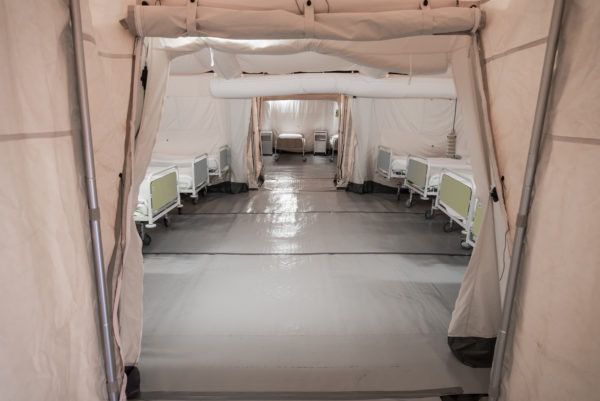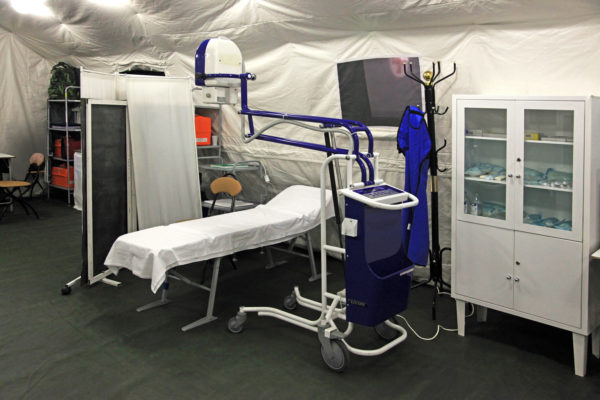How Mobile Field Hospitals Help Address Health Emergencies
A mobile field hospital is a mobile medical unit or a temporary hospital that provides care to patients on the scene until they can be safely transported to more permanent medical facilities. The term originated from military medicine (for example, the Mobile Army Surgical Hospital, or MASH) but has evolved to include natural disasters and other emergencies.
An emergency medical team equipped with mobile medical equipment and, in recent times, a big tent-like shelter that can be swiftly set up near the source of casualties is known as a deployable field hospital. If it’s in a city, it’s frequently housed in a conspicuous and easily accessible structure such as a government building (schools, hotels, etc.). In the case of an airborne building, it’s common practice to place mobile medical equipment in a standardized container, which is subsequently used as a refuge.

What Constitutes A Health Emergency?
According to the National Disaster Medical System Federal Partners Memorandum of Agreement, a public health emergency is defined as ‘a catastrophe, a substantial outbreak of an infectious illness, bioterrorist strike, or other significant or catastrophic event necessitating emergency health care [medical] services.’ Although epidemic-prone diseases are considered a public health emergency, the term also refers to risks posed by biological, chemical, and nuclear agents. It may include various problems such as environmental pollution, contaminated food, and pharmaceutical poisoning.
The best example of a health emergency is the COVID-19 pandemic (or coronavirus), which originated in China. Global economic and social institutions were severely damaged due to this outbreak, leading to the worst recession since the 1930s. It led to significant supply shortages, especially food shortages, because of the unstable supply chain and panic shopping. Pollution levels decreased to unprecedented lows as a result of the near-global lockdowns.
Public facilities were closed for most of the day in many regions, and many events were postponed or canceled altogether. Race and regional discrimination, health equity, and establishing a balance between public health and individual rights were all issues raised by the pandemic.

Here’s how mobile field hospitals help address health emergencies.
- Faster Deployment Of Medical Support
In cases of health emergencies, there’s no doubt there will be a higher need for medical support. Having access to a deployable field hospital can help address this problem, as medical teams will be able to stay on-site during an emergency. Beds will be available, so the staff won’t need to go home. It’ll also address the need for places where they can take a nap or a quick break to regain their composure.
- Patient Isolation
Human lives and security are at risk when new, developing or re-emerging infectious illnesses with high morbidity or fatality rates spread. While vaccines and treatments have been lacking in recent outbreaks such as Ebola virus disease (EVD) and SARS, the isolation of sick or symptomatic patients has been a typical response. The goal was to break the chain of infection from unhealthy to healthy people and limit the spread of disease.
Mobile field hospitals can be a great help when isolating patients. Because they’re mobile, adding territory won’t be a problem once there’s overcrowding in the area. It’ll also reduce the chances of spreading as there’ll be room for each patient without the need to put them in tight spaces. It’ll also allow those who aren’t isolated to get their regular check-ups and have medical attention without the risk of getting infected.
- Quality Medical Care
Having a large temporary structure will also mean that more staff are available, which can help hasten the process of healthcare and cater to more patients. Since a surge of patients is expected during a health emergency, it’s essential to have a place for staff to attend to the needs of patients. A bigger and easy-to-install hospital will significantly improve the quality of care for patients by lessening the chances of overcrowding during a disastrous situation.
Whenever there’s a health emergency, it’s essential to know that surgeries might be dangerous because of the increased risk of infections. Because of this, additional space for a ‘clean room’ is recommended, which is addressed by having a medical field hospital.
The Takeaway
Installing a medical field hospital is one of the best things to do during an emergency. Since there will be overcrowding in hospitals, it’s good to have a way to extend patient and staff space. It’s also best to isolate the sick from healthy people to avoid additional unwanted cases. Medical field hospitals are genuinely a remarkable temporary structure that offers many benefits whenever there’s a medical health emergency.



